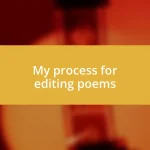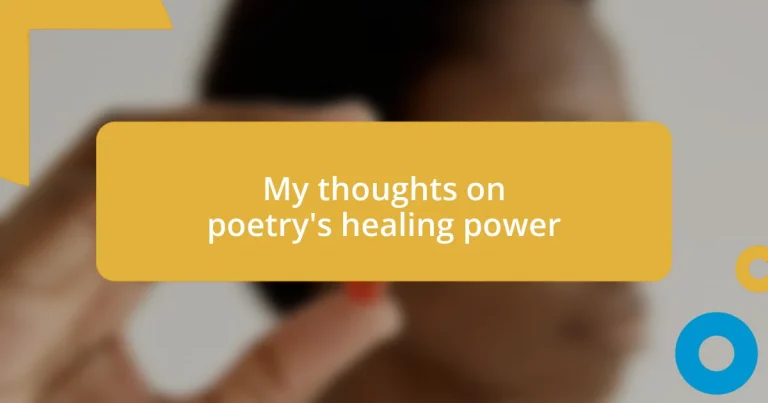Key takeaways:
- Poetry serves as a therapeutic outlet, allowing individuals to process emotions, leading to greater self-awareness and healing.
- Engagement with poetry fosters connection and community, enhancing empathy and understanding among individuals with shared experiences.
- Participating in poetry workshops and readings enriches the creative journey, providing inspiration and opportunities for personal growth.

Understanding poetry’s healing power
Poetry has an uncanny ability to articulate feelings that often remain unspoken. I remember writing a poem during a particularly rough patch in my life, where each line seemed to unravel the heaviness I carried inside. Isn’t it fascinating how the right words can transform our inner turmoil into something tangible?
When I think about the healing power of poetry, I often reflect on the cathartic release it offers. Engaging with poetry, whether through reading or writing, allows us to explore our deepest emotions in a structured way. Have you ever felt a sense of relief after writing verse that resonates with your pain or joy? It’s almost magical, as if those words become a refuge where we can safely confront our struggles.
Additionally, poetry fosters connection—not just with ourselves, but with others who share similar experiences. I once shared my poem at a local open mic and was surprised by the number of people who approached me, sharing their own stories. It made me realize that poetry acts as a bridge, allowing individuals to communicate their truths in a way that invites understanding and compassion. How incredible is that power of connection through mere words?
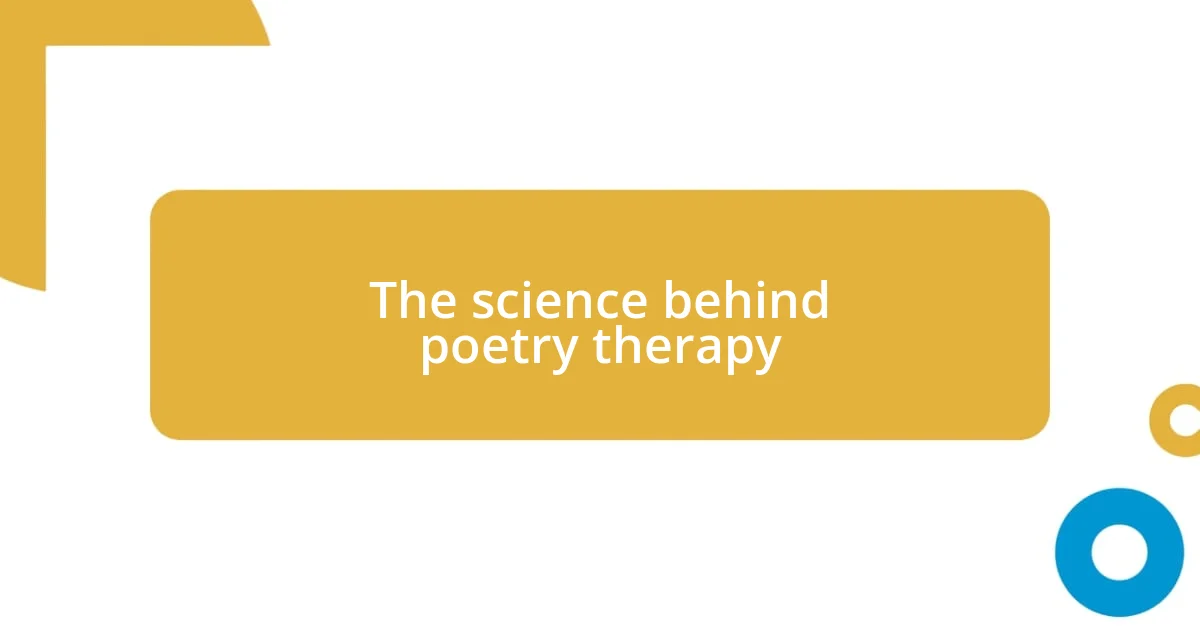
The science behind poetry therapy
Poetry therapy is anchored in solid psychological research, emphasizing its benefits in mental health treatment. For instance, studies have shown that writing poetry can significantly reduce anxiety and depression. I once encountered a participant in a workshop who shared how crafting her thoughts into poems shifted her perspective on life, illuminating paths toward healing she didn’t recognize before.
At the heart of poetry therapy lies expressive writing, a technique that allows individuals to articulate their emotions and experiences creatively. Engaging in this practice activates areas of the brain associated with emotional regulation. I’ve witnessed firsthand how reading participants’ works aloud can evoke powerful responses, creating a shared space of vulnerability and strength. It’s almost as if the room becomes charged with an understanding that words have the power to heal.
Furthermore, research indicates that poetry increases self-awareness and mindfulness. By engaging with poetic forms, individuals can observe their feelings and thoughts without judgment. I recall writing a poem where I simply listed my feelings—a therapeutic exercise that unveiled deeper layers of my emotional landscape. It’s like peeling back the layers of an onion; each layer reveals something new, enhancing introspection and personal growth.
| Element | Benefit |
|---|---|
| Expressive Writing | Helps in articulating and processing emotions. |
| Emotional Regulation | Activates brain areas that promote mental health. |
| Mindfulness | Increases self-awareness and promotes personal growth. |
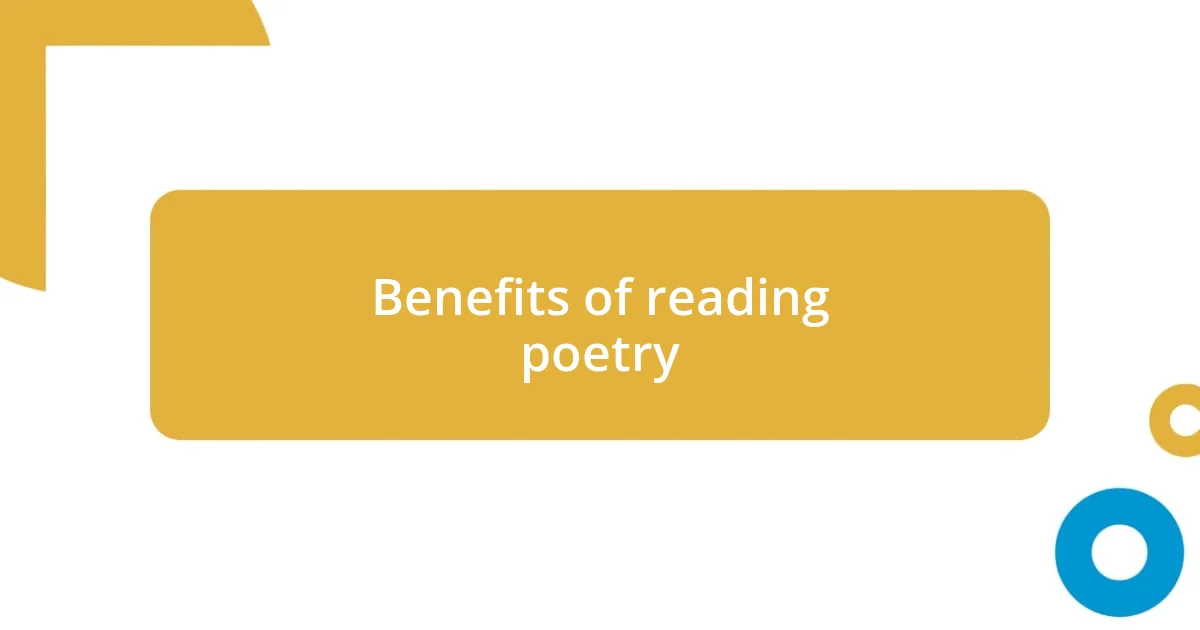
Benefits of reading poetry
Engaging with poetry not only provides an escape but also nurtures emotional growth. I remember getting lost in a collection of poems during a particularly stressful week. The lyrical beauty felt like a balm for my weary soul. Each poem seemed to echo my feelings and helped me see my experiences from new angles. It made me realize how poetry can articulate the confusion swirling in our minds, offering clarity and comfort.
Some of the benefits of reading poetry include:
- Emotional Expression: It allows us to express complex emotions that might be hard to convey otherwise.
- Stress Relief: Immersing ourselves in poetic language can reduce stress, making us feel lighter and more relaxed.
- Mental Stimulation: Poems challenge our thinking and invite us to see the world from different perspectives.
- Connection with Others: Sharing and discussing poetry fosters community and deepens our connections with others.
- Self-Reflection: Poetry encourages us to reflect on our thoughts and feelings, prompting personal discovery.
The beauty of poetry, for me, is that it resonates on individual levels, connecting with each reader’s unique journey. While revisiting favorite poems, I often find new layers of meaning that surprise me. It’s as if the poems grow alongside me, continually offering insights that feel just right for where I am at that moment in life.
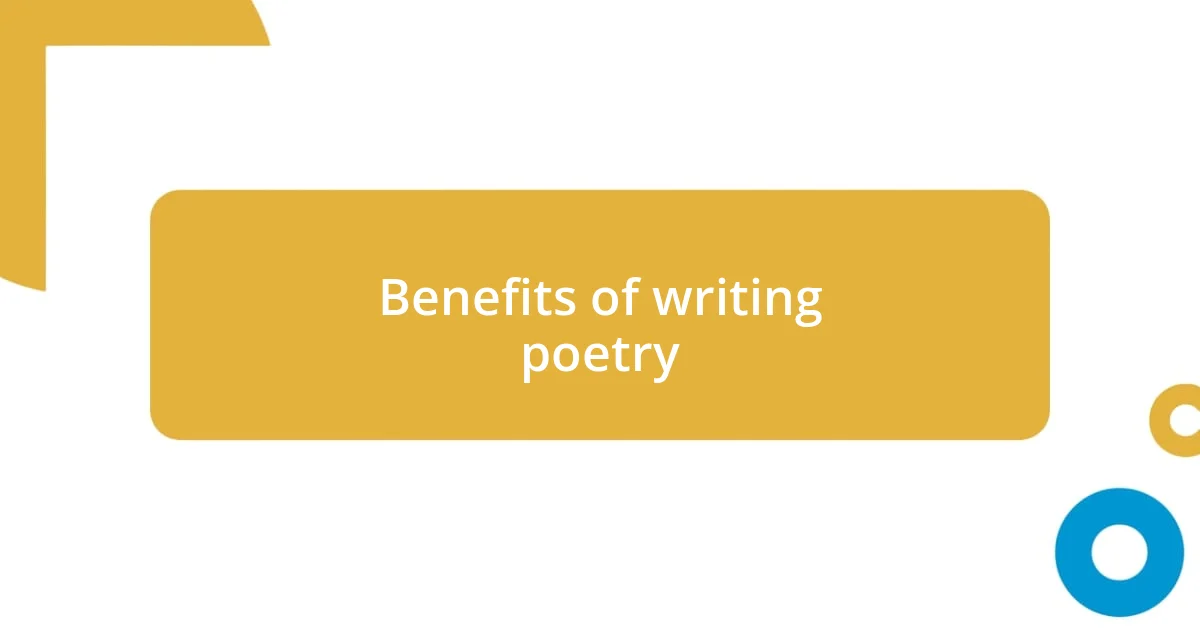
Benefits of writing poetry
Writing poetry serves as a therapeutic outlet, allowing individuals to express emotions that might otherwise remain bottled up. I’ve often found that capturing my thoughts in verse feels like a weight lifting off my shoulders. Have you ever felt a rush of relief after writing down your worries? It’s almost magical how transforming raw feelings into structured lines can bring clarity and peace.
Moreover, poetry encourages a deeper understanding of oneself. During my journey with writing, I’ve discovered aspects of my personality that I didn’t know existed. One time, I penned a poem about my childhood, and it opened up a floodgate of memories—both joyful and painful—leading to a profound sense of healing. This process of self-discovery is invaluable, as it fosters a connection with our true selves amidst life’s chaos.
Lastly, the act of writing poetry can cultivate resilience. When faced with setbacks, I often turn to verse as a way to articulate my struggles. It’s empowering to turn obstacles into poems that reflect my journey. In this way, poetry not only helps to process difficult experiences but also transforms them into a source of strength. I wonder if you’ve experienced something similar—taking your challenges and weaving them into words that inspire growth and transformation.
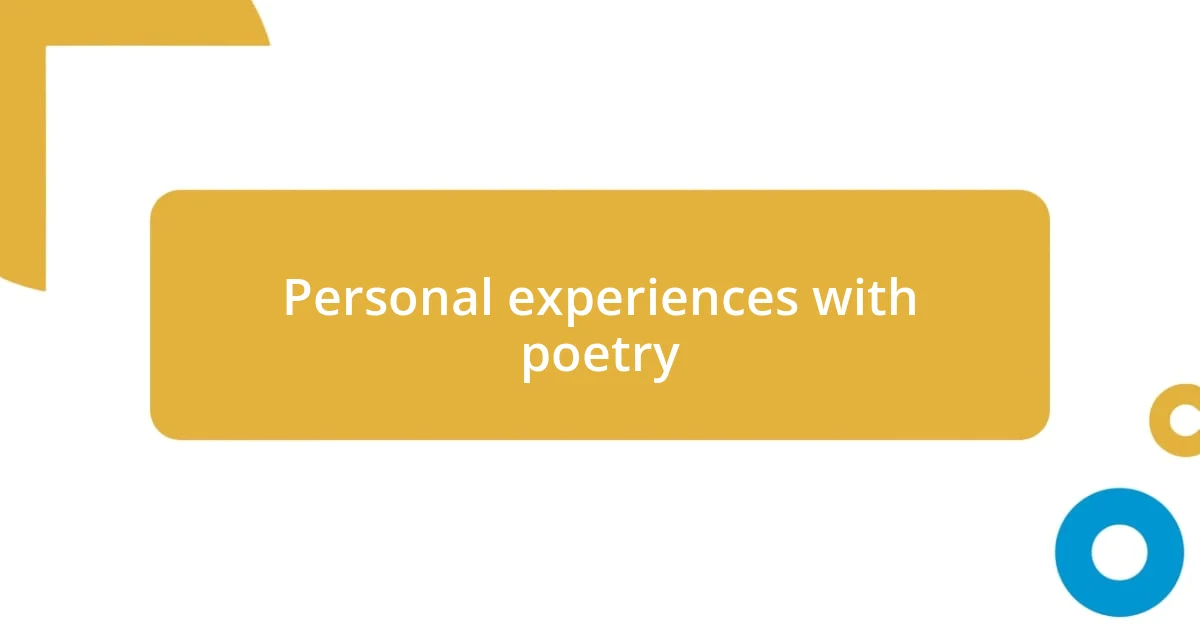
Personal experiences with poetry
I vividly remember the first time I shared a poem I had written in a small workshop. My palms were sweaty, and my heart raced as I stood in front of my peers. But once I began to read, I noticed the collective breath in the room—it felt like I wasn’t just sharing my words but connecting deeply with others. Have you ever felt that surge when your message resonates? I realized then that poetry could bridge the gap between isolated feelings and a shared human experience.
As I experimented with different forms of poetry, I found myself drawn to free verse. This style allowed me to break free from traditional structures, reflecting the chaos of emotions swirling within me. One night, after a particularly long day, I sat down and poured everything into a piece about frustration and hope. The act of letting my thoughts flow onto the page provided an unexpected relief. It’s almost as if the ink carried away some of my burdens.
The beauty of revisiting my old poems is that they often reveal how far I’ve come. Recently, I stumbled upon a poem I wrote during a dark period; I was astounded by the raw intensity of my emotions back then. Reading it reminded me of the healing journey I’ve taken. It’s intriguing to think about how poetry captures not just moments, but the essence of our evolution. Have you ever revisited something you created and found it to be a mirror of your growth?
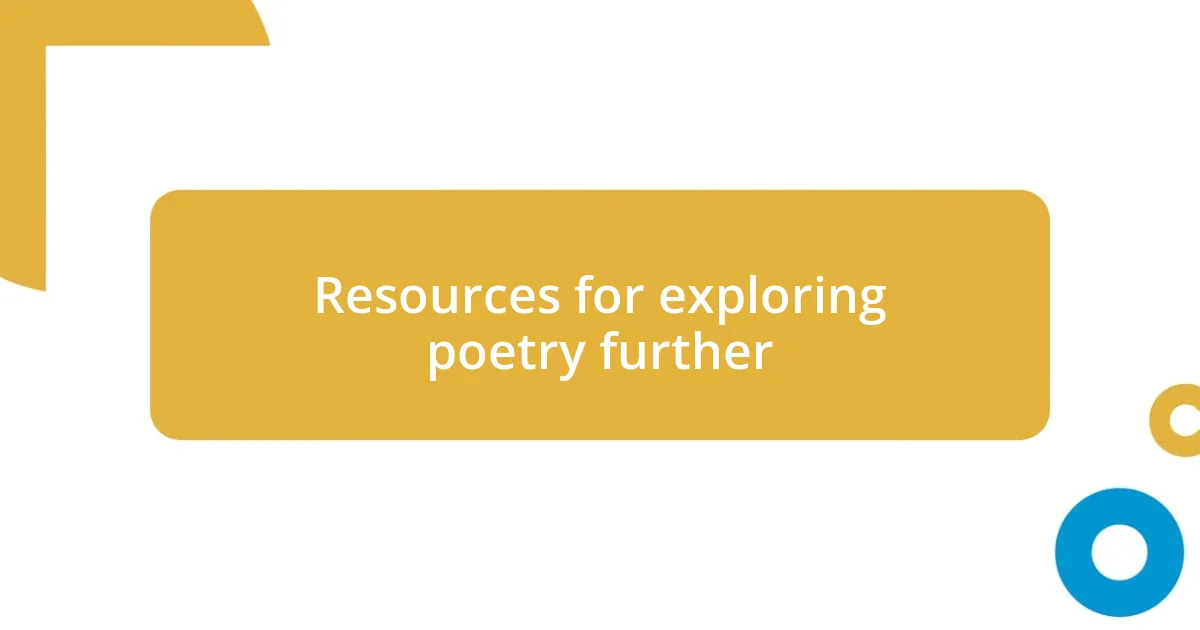
Resources for exploring poetry further
Exploring poetry doesn’t have to be a solitary journey. I’ve found that joining local poetry groups or online forums can help foster a sense of community. Through these platforms, I’ve exchanged insights with fellow poetry lovers and discovered new styles and techniques that truly enriched my writing experience. Have you ever found inspiration by simply sharing your work with others? I think engaging with different perspectives opens up a world of possibilities.
Reading poetry collections by both established and emerging poets is another fantastic way to deepen your appreciation. I’ll never forget how the works of poets like Mary Oliver and Rumi resonated with me during different stages of my life. Their words drew me into rich emotional landscapes, prompting my own reflections and responses. What about the poets you admire? Their unique voices can guide you to explore your style while igniting something within you.
Lastly, consider attending poetry readings or workshops. These events allow you not only to witness the passion behind spoken word but also to practice your craft in a supportive environment. I recall my first open mic night; the energy in the room encouraged me to step outside my comfort zone. Have you ever experienced that exhilaration of sharing your work live? It’s an unforgettable experience that can motivate you to keep creating and evolving as a poet.











